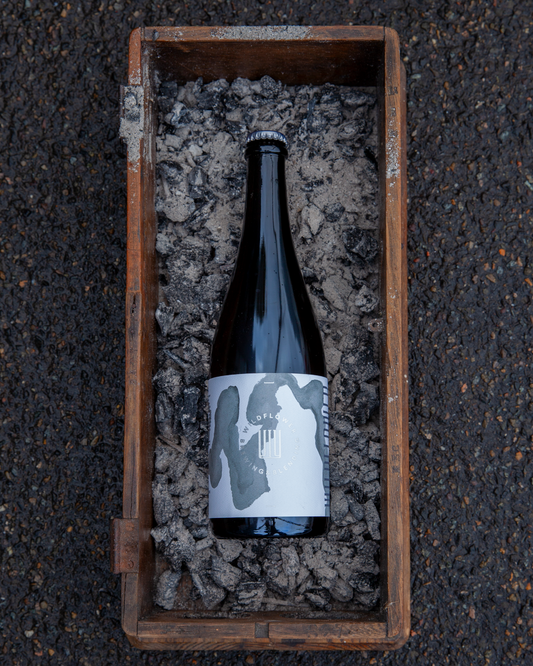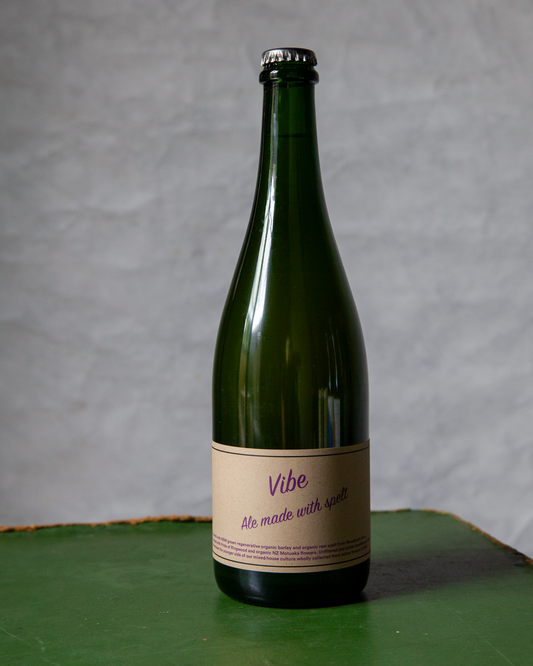Dale Dug a Hole will be available online and for take-away/collection from 12pm (Sydney time) on Friday 3 September 2021.
Dale Dug a Hole is a young Australian Wild Ale made with perennial cereal grain 11955 grown by the NSW Department of Primary Industries in Cowra, NSW as well as dandelions from Chris and Em's farm in Cygnet, Tasmania picked by their kids. Fermented and aged in a single puncheon before bottling, conditioning and maturation ahead of release.
This is a particularly special beer. Well over a year ago, I was invited by the inimitable Emily Salkeld of Small World Bakery in Langhorne Creek SA to participate in a series of trials utilising perennial grains grown here in NSW. A perennial cereal grain is one that is able to to harvested for more than one year. They share commonalities with ancient, ancient grains which naturally did not require annual sowing for annual harvests. While work has been done to introduce perennials into our modern agricultural framework for over a century, series of political and economic factors have gotten in the way and still now, these grains remain a curio of researchers and impassioned grain advocates such as Emily, Jason Cotter of Tuerong Farm and others in the grAiNZ group here in Australia. Globally, there are similar consortiums of industry and land research/care groups working on these as well... and to be honest, as a latecomer to the party, it really seems like we're on the precipice of something.
But back to the grains... The perennial grain offers an alternative future and I’m excited about it. We’re so lucky to have a small group of researchers at the New South Wales Department of Primary Industry led by Dr Matthew Newell who for many years have believed in these grains and grown up seed planting by hand without a huge amount of funding.
That means these grains are incredibly rare and honestly only a handful of people in the world have had the chance to work with them. Again, I'd like to express my gratitude to the researchers and the rest of the perennial working group for letting us have a play.
Perennials mean harvesting & baking & brewing & distilling & eating grains that maintain year-round ground cover, eliminate the need for yearly tillage and sowing, are more nutrient dense and have the ability to preform much more like their ancient ancestors. For centuries we have built ourselves into a dependency on annual cereal crops with a focus on yield... tonnes or $/hectare... we need to reimagine yield and consider a more nuanced calculation of agronomics which take into account protein density, minimised equipment/fuel requirements, carbon sequestration abilities and input costs (ie synthetic fertiliser, nitrogen which releases ~half of its weight into the atmosphere as nitrous oxide which has about 300 times the heat-trapping power of carbon dioxide as a GHG, not good)(this on conventional barley accounts for a huge chunk of the carbon footprint of beer, organic matters).
We used the grain in its raw form, unmalted at a rate of 30% of the grist, which is similar to the amount of raw wheat we use in our Gold recipe. We did this to have a control to compare the flavour of 11955 against the raw red wheat we use in Gold. In addition to the 11955, we decided to boil with dandelions that we had asked Chris' kids to pick from a paddock in front of their house just outside Cygnet, Tasmania.
Dale ended up being a very drinkable 4.2% ABV as the extraction from the grain as well as brew length were not as we had calculated going into it. The resultant beer; however, has a table-beer esq freshness, carrying a bit more earthy body while the flavour from the flowers comes late in the palate and will be familiar to lovers of Fantome's Pissenlit.
The name of this beer, along with many of our other green bottle saison-inspired ales, come out of the book of Australian sayings. Quite obviously, its a quote from the 1997 comedic masterpiece that is The Castle.
There are 100 bottles available online and another 60 available at cellar door.




